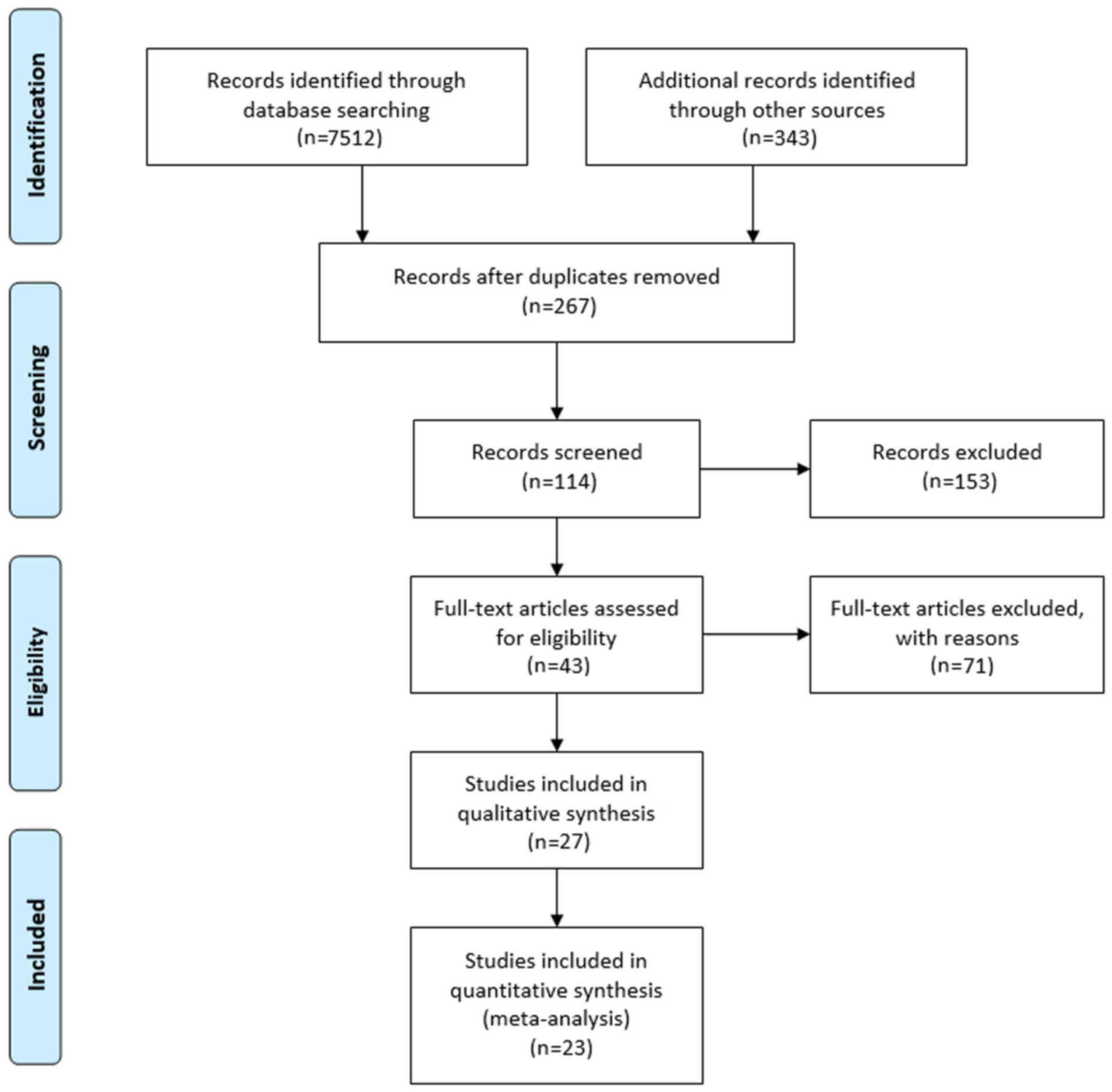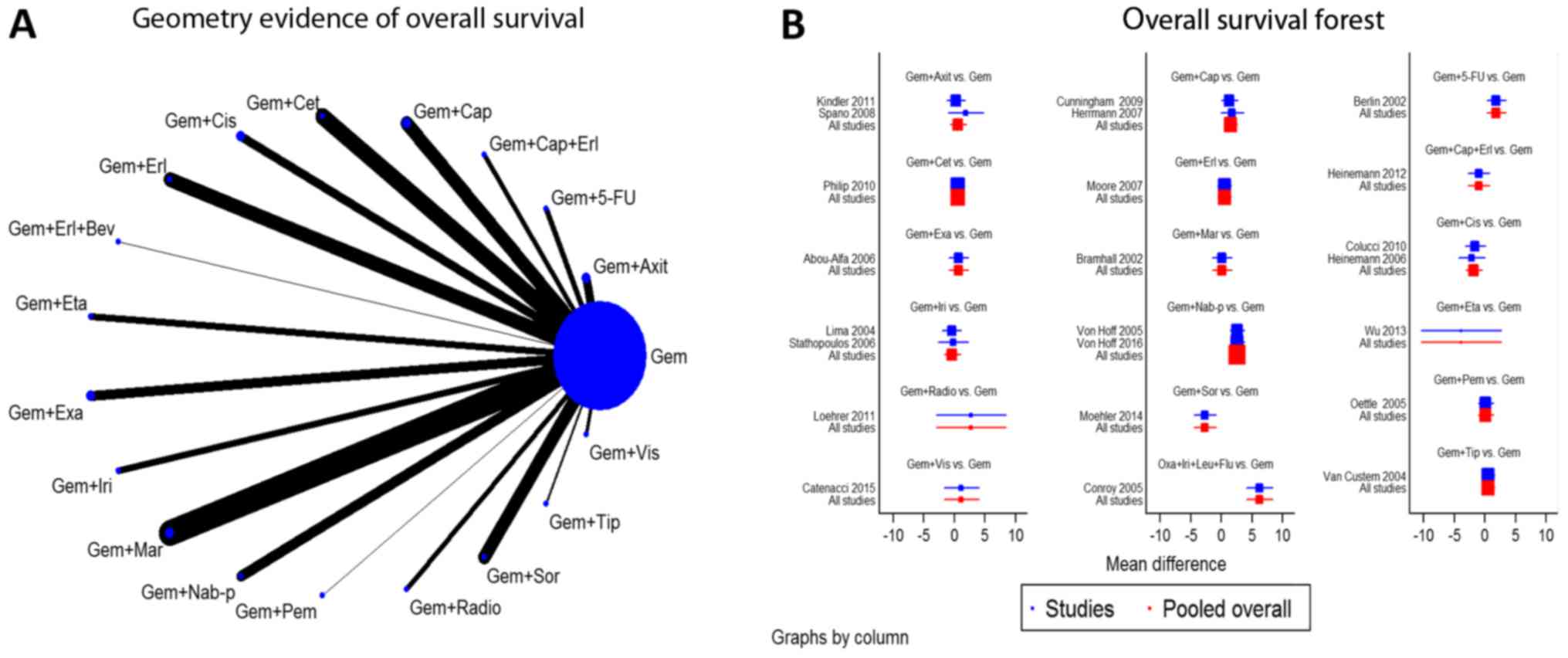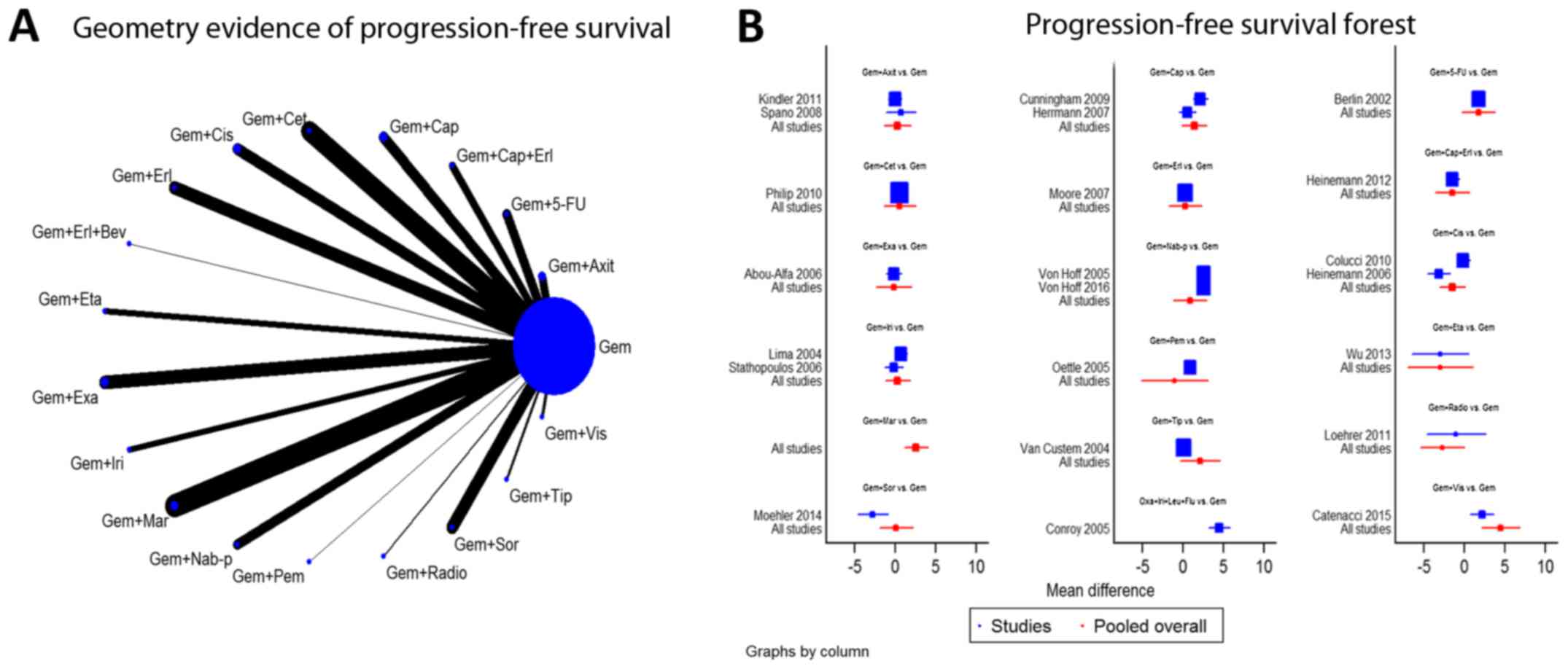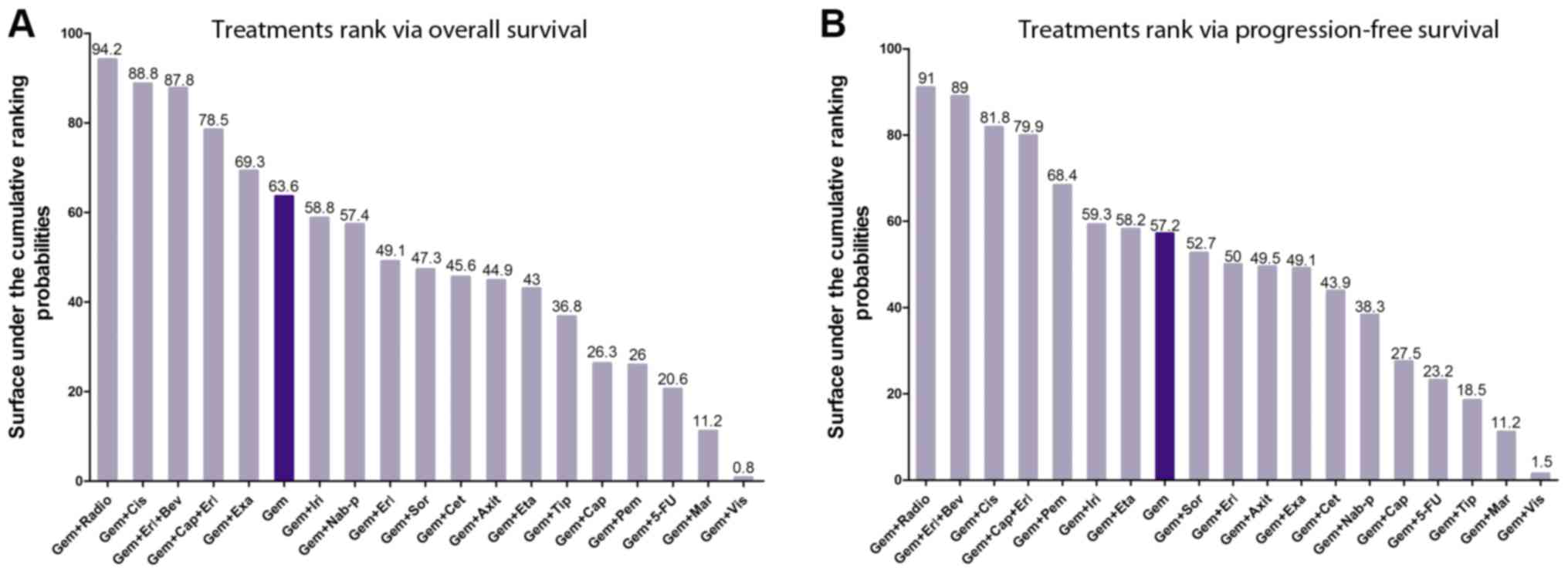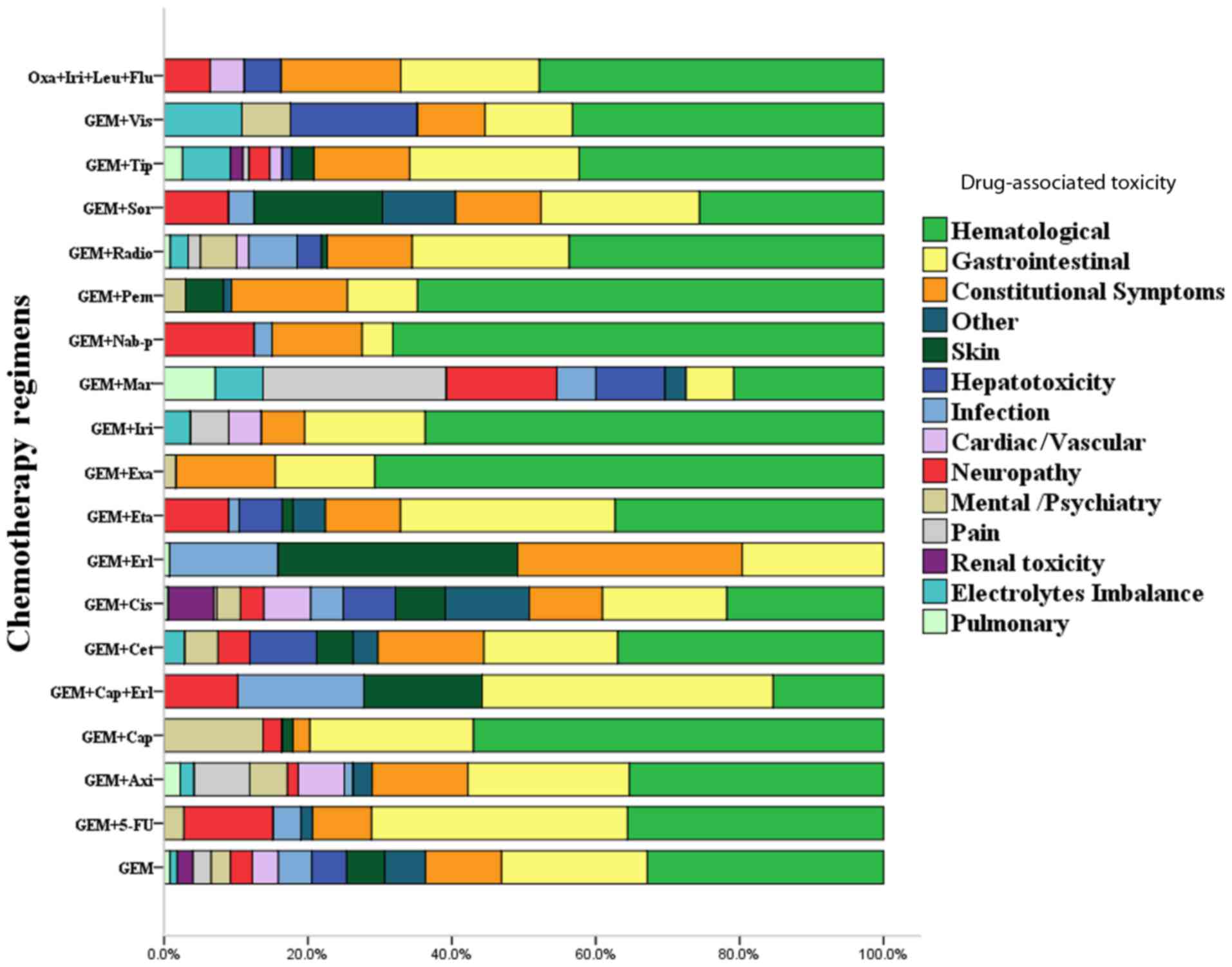|
1
|
Goral V: Pancreatic cancer: Pathogenesis
and diagnosis. Asian Pac J Cancer Prev. 16:5619–5624. 2015.
View Article : Google Scholar : PubMed/NCBI
|
|
2
|
Pancreatic Cancer Action Network: The
alarming rise of pancreatic cancer deaths in the United States. Why
we need to stem the tide today. Pancreatic Cancer Action Network;
Manhattan Beach, CA: 2012
|
|
3
|
Krechler T, Horejs J, Ulrych J, Zeman M,
Macásek J, Dusková J and Zák A: Current status of pancreatic cancer
diagnosis. Cas Lek Cesk. 150:587–593. 2011.(In Czech). PubMed/NCBI
|
|
4
|
Freelove R and Walling AD: Pancreatic
cancer: Diagnosis and management. Am Fam Physician. 73:485–492.
2006.PubMed/NCBI
|
|
5
|
Chen WQ, Liang D, Zhang SW, Zheng RS and
He YT: Pancreatic cancer incidence and mortality patterns in china,
2009. Asian Pac J Cancer Prev. 14:7321–7324. 2013. View Article : Google Scholar : PubMed/NCBI
|
|
6
|
Wang Y, Schrag D, Brooks GA and Dominici
F: National trends in pancreatic cancer outcomes and pattern of
care among Medicare beneficiaries, 2000 through 2010. Cancer.
120:1050–1058. 2014. View Article : Google Scholar : PubMed/NCBI
|
|
7
|
Akhtar-Danesh GG, Finley C and
Akhtar-Danesh N: Long-term trends in the incidence and relative
survival of pancreatic cancer in Canada: A population-based study.
Pancreatology. 16:259–265. 2016. View Article : Google Scholar : PubMed/NCBI
|
|
8
|
Burris HA III, Moore MJ, Andersen J, Green
MR, Rothenberg ML, Modiano MR, Cripps MC, Portenoy RK, Storniolo
AM, Tarassoff P, et al: Improvements in survival and clinical
benefit with gemcitabine as first-line therapy for patients with
advanced pancreas cancer: A randomized trial. J Clin Oncol.
15:2403–2413. 1997. View Article : Google Scholar : PubMed/NCBI
|
|
9
|
Abbruzzese JL: New applications of
gemcitabine and future directions in the management of pancreatic
cancer. Cancer. 95 (Suppl 4):941–945. 2002. View Article : Google Scholar : PubMed/NCBI
|
|
10
|
Macdonald JS: Clinical overview: Adjuvant
therapy of gastrointestinal cancer. Cancer Chemother Pharmacol. 54
Suppl 1:S4–S11. 2004.PubMed/NCBI
|
|
11
|
Okusaka T, Ishii H, Funakoshi A, Ueno H,
Furuse J and Sumii T: A phase I/II study of combination
chemotherapy with gemcitabine and 5-fluorouracil for advanced
pancreatic cancer. Jpn J Clin Oncol. 36:557–563. 2006. View Article : Google Scholar : PubMed/NCBI
|
|
12
|
Shi S, Yao W, Xu J, Long J, Liu C and Yu
X: Combinational therapy: New hope for pancreatic cancer? Cancer
Lett. 317:127–135. 2012. View Article : Google Scholar : PubMed/NCBI
|
|
13
|
Kristensen A, Vagnildhaug OM, Grønberg BH,
Kaasa S, Laird B and Solheim TS: Does chemotherapy improve
health-related quality of life in advanced pancreatic cancer? A
systematic review. Crit Rev Oncol Hematol. 99:286–298. 2016.
View Article : Google Scholar : PubMed/NCBI
|
|
14
|
Gresham GK, Wells GA, Gill S, Cameron C
and Jonker DJ: Chemotherapy regimens for advanced pancreatic
cancer: A systematic review and network meta-analysis. BMC Cancer.
14:4712014. View Article : Google Scholar : PubMed/NCBI
|
|
15
|
Ansari D, Tingstedt B, Andersson B,
Holmquist F, Sturesson C, Williamsson C, Sasor A, Borg D, Bauden M
and Andersson R: Pancreatic cancer: Yesterday, today and tomorrow.
Future Oncol. 12:1929–1946. 2016. View Article : Google Scholar : PubMed/NCBI
|
|
16
|
Siegel RL, Miller KD and Jemal A: Cancer
statistics, 2016. CA Cancer J Clin. 66:7–30. 2016. View Article : Google Scholar : PubMed/NCBI
|
|
17
|
Birhanu G, Javar HA, Seyedjafari E and
Zandi-Karimi A: Nanotechnology for delivery of gemcitabine to treat
pancreatic cancer. Biomed Pharmacother. 88:635–643. 2017.
View Article : Google Scholar : PubMed/NCBI
|
|
18
|
Moher D, Liberati A, Tetzlaff J and Altman
DG: PRISMA Group: Preferred reporting items for systematic reviews
and meta-analyses: The PRISMA statement. PLoS Med. 6:e10000972009.
View Article : Google Scholar : PubMed/NCBI
|
|
19
|
Chaimani A, Higgins JP, Mavridis D,
Spyridonos P and Salanti G: Graphical tools for network
meta-analysis in STATA. PLoS One. 8:e766542013. View Article : Google Scholar : PubMed/NCBI
|
|
20
|
Biermann JS, Chow W, Reed DR, Lucas D,
Adkins DR, Agulnik M, Benjamin RS, Brigman B, Budd GT, Curry WT, et
al: NCCN guidelines insights: Bone cancer, version 2.2017. J Natl
Compr Canc Netw. 15:155–167. 2017. View Article : Google Scholar : PubMed/NCBI
|
|
21
|
Hernández-Quiles C, Bernabeu-Wittel M,
Pérez-Belmonte LM, Macías-Mir P, Camacho-González D, Massa B,
Maiz-Jiménez M and Ollero-Baturone M: PALIAR investigators:
Concordance of Barthel Index, ECOG-PS, and Palliative Performance
Scale in the assessment of functional status in patients with
advanced medical diseases. BMJ Support Palliat Care. 7:300–307.
2017.PubMed/NCBI
|
|
22
|
Lovato N, Lack L, Wright H and Kennaway
DJ: Evaluation of a brief treatment program of cognitive behavior
therapy for insomnia in older adults. Sleep. 37:117–126. 2014.
View Article : Google Scholar : PubMed/NCBI
|
|
23
|
Salanti G, Ades AE and Ioannidis JP:
Graphical methods and numerical summaries for presenting results
from multiple-treatment meta-analysis: An overview and tutorial. J
Clin Epidemiol. 64:163–171. 2011. View Article : Google Scholar : PubMed/NCBI
|
|
24
|
Jutric Z and Melstrom LG: New treatment
options and management considerations in borderline resectable
pancreatic cancer. Oncology (Williston Park). 31:443–452.
2017.PubMed/NCBI
|
|
25
|
Sugarbaker PH: Strategies to improve local
control of resected pancreas adenocarcinoma. Surg Oncol. 26:63–70.
2017. View Article : Google Scholar : PubMed/NCBI
|
|
26
|
Youl M, Hashem S, Brade A, Cummings B,
Dawson LA, Gallinger S, Hedley D, Jiang H, Kim J, Krzyzanowska MK,
et al: Induction gemcitabine plus concurrent gemcitabine and
radiotherapy for locally advanced unresectable or resected
pancreatic cancer. Clin Oncol (R Coll Radiol). 26:203–209. 2014.
View Article : Google Scholar : PubMed/NCBI
|
|
27
|
Kalser MH and Ellenberg SS: Pancreatic
cancer. Adjuvant combined radiation and chemotherapy following
curative resection. Arch Surg. 120:899–903. 1985. View Article : Google Scholar : PubMed/NCBI
|
|
28
|
Aapro MS, Martin C and Hatty S:
Gemcitabine-a safety review. Anticancer Drugs. 9:191–201. 1998.
View Article : Google Scholar : PubMed/NCBI
|
|
29
|
Regine WF, Winter KA, Abrams RA, Safran H,
Hoffman JP, Konski A, Benson AB, Macdonald JS, Kudrimoti MR, Fromm
ML, et al: Fluorouracil vs gemcitabine chemotherapy before and
after fluorouracil-based chemoradiation following resection of
pancreatic adenocarcinoma: A randomized controlled trial. JAMA.
299:1019–1026. 2008. View Article : Google Scholar : PubMed/NCBI
|
|
30
|
Cunningham D, Chau I, Stocken DD, Valle
JW, Smith D, Steward W, Harper PG, Dunn J, Tudur-Smith C, West J,
et al: Phase III randomized comparison of gemcitabine versus
gemcitabine plus capecitabine in patients with advanced pancreatic
cancer. J Clin Oncol. 27:5513–5518. 2009. View Article : Google Scholar : PubMed/NCBI
|
|
31
|
Vaccaro V, Sperduti I and Milella M:
FOLFIRINOX versus gemcitabine for metastatic pancreatic cancer. N
Engl J Med. 365:768–769; author reply 769. 2011. View Article : Google Scholar : PubMed/NCBI
|
|
32
|
Conroy T, Desseigne F, Ychou M, Bouché O,
Guimbaud R, Bécouarn Y, Adenis A, Raoul JL, Gourgou-Bourgade S, de
la Fouchardière C, et al: FOLFIRINOX versus gemcitabine for
metastatic pancreatic cancer. N Engl J Med. 364:1817–1825. 2011.
View Article : Google Scholar : PubMed/NCBI
|
|
33
|
Rhim AD, Oberstein PE, Thomas DH, Mirek
ET, Palermo CF, Sastra SA, Dekleva EN, Saunders T, Becerra CP,
Tattersall IW, et al: Stromal elements act to restrain, rather than
support, pancreatic ductal adenocarcinoma. Cancer Cell. 25:735–747.
2014. View Article : Google Scholar : PubMed/NCBI
|
|
34
|
Fox RG, Lytle NK, Jaquish DV, Park FD, Ito
T, Bajaj J, Koechlein CS, Zimdahl B, Yano M, Kopp J, et al:
Image-based detection and targeting of therapy resistance in
pancreatic adenocarcinoma. Nature. 534:407–411. 2016. View Article : Google Scholar : PubMed/NCBI
|
|
35
|
Citterio C, Baccini M, Orlandi E, Di
Nunzio C and Cavanna L: Second-line chemotherapy for the treatment
of metastatic pancreatic cancer after first-line gemcitabine-based
chemotherapy: A network meta-analysis. Oncotarget. 9:29801–29809.
2018. View Article : Google Scholar : PubMed/NCBI
|
|
36
|
Chiorean EG, Von Hoff DD, Tabernero J,
El-Maraghi R, Wee Ma W, Reni M, Harris M, Whorf R, Liu H, Shiansong
Li J, et al: Second-line therapy after nab-paclitaxel plus
gemcitabine or after gemcitabine for patients with metastatic
pancreatic cancer. Br J Cancer. 115:e132016. View Article : Google Scholar : PubMed/NCBI
|
|
37
|
Oettle H, Riess H, Stieler JM, Heil G,
Schwaner I, Seraphin J, Görner M, Mölle M, Greten TF, Lakner V, et
al: Second-line oxaliplatin, folinic acid, and fluorouracil versus
folinic acid and fluorouracil alone for gemcitabine-refractory
pancreatic cancer: Outcomes from the CONKO-003 trial. J Clin Oncol.
32:2423–2429. 2014. View Article : Google Scholar : PubMed/NCBI
|
|
38
|
Walker EJ and Ko AH: Beyond first-line
chemotherapy for advanced pancreatic cancer: An expanding array of
therapeutic options? World J Gastroenterol. 20:2224–2236. 2014.
View Article : Google Scholar : PubMed/NCBI
|
|
39
|
Schultheis B, Reuter D, Ebert MP, Siveke
J, Kerkhoff A, Berdel WE, Hofheinz R, Behringer DM, Schmidt WE,
Goker E, et al: Gemcitabine combined with the monoclonal antibody
nimotuzumab is an active first-line regimen in KRAS wildtype
patients with locally advanced or metastatic pancreatic cancer: A
multicenter, randomized phase IIb study. Ann Oncol. 28:2429–2435.
2017. View Article : Google Scholar : PubMed/NCBI
|
|
40
|
Colucci G, Giuliani F, Gebbia V, Biglietto
M, Rabitti P, Uomo G, Cigolari S, Testa A, Maiello E and Lopez M:
Gemcitabine alone or with cisplatin for the treatment of patients
with locally advanced and/or metastatic pancreatic carcinoma: A
prospective, randomized phase III study of the Gruppo Oncologia
dell'Italia Meridionale. Cancer. 94:902–910. 2002. View Article : Google Scholar : PubMed/NCBI
|
|
41
|
Berlin JD, Catalano P, Thomas JP, Kugler
JW, Haller DG and Benson AB III: Phase III study of gemcitabine in
combination with fluorouracil versus gemcitabine alone in patients
with advanced pancreatic carcinoma: Eastern Cooperative Oncology
Group Trial E2297. J Clin Oncol. 20:3270–3275. 2002. View Article : Google Scholar : PubMed/NCBI
|
|
42
|
Bramhall SR, Schulz J, Nemunaitis J, Brown
PD, Baillet M and Buckels JA: A double-blind placebo-controlled,
randomised study comparing gemcitabine and marimastat with
gemcitabine and placebo as first line therapy in patients with
advanced pancreatic cancer. Br J Cancer. 87:161–167. 2002.
View Article : Google Scholar : PubMed/NCBI
|
|
43
|
Rocha Lima CM, Green MR, Rotche R, Miller
WH Jr, Jeffrey GM, Cisar LA, Morganti A, Orlando N, Gruia G and
Miller LL: Irinotecan plus gemcitabine results in no survival
advantage compared with gemcitabine monotherapy in patients with
locally advanced or metastatic pancreatic cancer despite increased
tumor response rate. J Clin Oncol. 22:3776–3783. 2004. View Article : Google Scholar : PubMed/NCBI
|
|
44
|
Van Cutsem E, van de Velde H, Karasek P,
Oettle H, Vervenne WL, Szawlowski A, Schoffski P, Post S, Verslype
C, Neumann H, et al: Phase III trial of gemcitabine plus tipifarnib
compared with gemcitabine plus placebo in advanced pancreatic
cancer. J Clin Oncol. 22:1430–1438. 2004. View Article : Google Scholar : PubMed/NCBI
|
|
45
|
Oettle H, Richards D, Ramanathan RK, van
Laethem JL, Peeters M, Fuchs M, Zimmermann A, John W, Von Hoff D,
Arning M and Kindler HL: A phase III trial of pemetrexed plus
gemcitabine versus gemcitabine in patients with unresectable or
metastatic pancreatic cancer. Ann Oncol. 16:1639–1645. 2005.
View Article : Google Scholar : PubMed/NCBI
|
|
46
|
Von Hoff DD, Ervin TJ, Arena FP, Gabriela
Chiorean E, Infante JR, Moore M, Seay TE, Tjulandin S, Ma WW, Saleh
M, et al: Randomized phase III study of weekly nab-paclitaxel plus
gemcitabine versus gemcitabine alone in patients with metastatic
adenocarcinoma of the pancreas (MPACT). J Clin Oncol. 31:LBA148.
2013. View Article : Google Scholar
|
|
47
|
Abou-Alfa GK, Letourneau R, Harker G,
Modiano M, Hurwitz H, Tchekmedyian NS, Feit K, Ackerman J, De Jager
RL, Eckhardt SG and O'Reilly EM: Randomized phase III study of
exatecan and gemcitabine compared with gemcitabine alone in
untreated advanced pancreatic cancer. J Clin Oncol. 24:4441–4447.
2006. View Article : Google Scholar : PubMed/NCBI
|
|
48
|
Heinemann V, Quietzsch D, Gieseler F,
Gonnermann M, Schönekäs H, Rost A, Neuhaus H, Haag C, Clemens M,
Heinrich B, et al: Randomized phase III trial of gemcitabine plus
cisplatin compared with gemcitabine alone in advanced pancreatic
cancer. J Clin Oncol. 24:3946–3952. 2006. View Article : Google Scholar : PubMed/NCBI
|
|
49
|
Stathopoulos GP, Syrigos K, Aravantinos G,
Polyzos A, Papakotoulas P, Fountzilas G, Potamianou A, Ziras N,
Boukovinas J, Varthalitis J, et al: A multicenter phase III trial
comparing irinotecan-gemcitabine (IG) with gemcitabine (G)
monotherapy as first-line treatment in patients with locally
advanced or metastatic pancreatic cancer. Br J Cancer. 95:587–592.
2006. View Article : Google Scholar : PubMed/NCBI
|
|
50
|
Herrmann R, Bodoky G, Ruhstaller T,
Glimelius B, Bajetta E, Schüller J, Saletti P, Bauer J, Figer A,
Pestalozzi B, et al: Gemcitabine plus capecitabine compared with
gemcitabine alone in advanced pancreatic cancer: A randomized,
multicenter, phase III trial of the Swiss Group for Clinical Cancer
Research and the Central European Cooperative Oncology Group. J
Clin Oncol. 25:2212–2217. 2007. View Article : Google Scholar : PubMed/NCBI
|
|
51
|
Moore MJ, Goldstein D, Hamm J, Figer A,
Hecht JR, Gallinger S, Au HJ, Murawa P, Walde D, Wolff RA, et al:
Erlotinib plus gemcitabine compared with gemcitabine alone in
patients with advanced pancreatic cancer: A phase III trial of the
National Cancer Institute of Canada Clinical Trials Group. J Clin
Oncol. 25:1960–1966. 2007. View Article : Google Scholar : PubMed/NCBI
|
|
52
|
Spano JP, Chodkiewicz C, Maurel J, Wong R,
Wasan H, Barone C, Létourneau R, Bajetta E, Pithavala Y, Bycott P,
et al: Efficacy of gemcitabine plus axitinib compared with
gemcitabine alone in patients with advanced pancreatic cancer: An
open-label randomised phase II study. Lancet. 371:2101–2108. 2008.
View Article : Google Scholar : PubMed/NCBI
|
|
53
|
Philip PA, Benedetti J, Corless CL, Wong
R, O'Reilly EM, Flynn PJ, Rowland KM, Atkins JN, Mirtsching BC,
Rivkin SE, et al: Phase III study comparing gemcitabine plus
cetuximab versus gemcitabine in patients with advanced pancreatic
adenocarcinoma: Southwest Oncology Group-directed intergroup trial
S0205. J Clin Oncol. 28:3605–3610. 2010. View Article : Google Scholar : PubMed/NCBI
|
|
54
|
Kindler HL, Ioka T, Richel DJ, Bennouna J,
Létourneau R, Okusaka T, Funakoshi A, Furuse J, Park YS, Ohkawa S,
et al: Axitinib plus gemcitabine versus placebo plus gemcitabine in
patients with advanced pancreatic adenocarcinoma: A double-blind
randomised phase 3 study. Lancet Oncol. 12:256–262. 2011.
View Article : Google Scholar : PubMed/NCBI
|
|
55
|
Loehrer PJ Sr, Feng Y, Cardenes H, Wagner
L, Brell JM, Cella D, Flynn P, Ramanathan RK, Crane CH, Alberts SR
and Benson AB III: Gemcitabine alone versus gemcitabine plus
radiotherapy in patients with locally advanced pancreatic cancer:
An Eastern Cooperative Oncology Group trial. J Clin Oncol.
29:4105–4112. 2011. View Article : Google Scholar : PubMed/NCBI
|
|
56
|
Heinemann V, Vehling-Kaiser U, Waldschmidt
D, Kettner E, Märten A, Winkelmann C, Klein S, Kojouharoff G,
Gauler TC, von Weikersthal LF, et al: Gemcitabine plus erlotinib
followed by capecitabine versus capecitabine plus erlotinib
followed by gemcitabine in advanced pancreatic cancer: Final
results of a randomised phase 3 trial of the ‘Arbeitsgemeinschaft
Internistische Onkologie’ (AIO-PK0104). Gut. 62:751–759. 2013.
View Article : Google Scholar : PubMed/NCBI
|
|
57
|
Wu C, Fernandez SA, Criswell T, Chidiac
TA, Guttridge D, Villalona-Calero M and Bekaii-Saab TS: Disrupting
cytokine signaling in pancreatic cancer: A phase I/II study of
etanercept in combination with gemcitabine in patients with
advanced disease. Pancreas. 42:813–818. 2013. View Article : Google Scholar : PubMed/NCBI
|
|
58
|
Moehler M, Maderer A, Schimanski C,
Kanzler S, Denzer U, Kolligs FT, Ebert MP, Distelrath A, Geissler
M, Trojan J, et al: Gemcitabine plus sorafenib versus gemcitabine
alone in advanced biliary tract cancer: A double-blind
placebo-controlled multicentre phase II AIO study with biomarker
and serum programme. Eur J Cancer. 50:3125–3135. 2014. View Article : Google Scholar : PubMed/NCBI
|
|
59
|
Catenacci DV, Junttila MR, Karrison T,
Bahary N, Horiba MN, Nattam SR, Marsh R, Wallace J, Kozloff M,
Rajdev L, et al: Randomized phase Ib/II study of gemcitabine plus
placebo or vismodegib, a hedgehog pathway inhibitor, in patients
with metastatic pancreatic cancer. J Clin Oncol. 33:4284–4292.
2015. View Article : Google Scholar : PubMed/NCBI
|
|
60
|
Ramanathan RK, Goldstein D, Korn RL, Arena
F, Moore M, Siena S, Teixeira L, Tabernero J, Van Laethem JL, Liu
H, et al: Positron emission tomography response evaluation from a
randomized phase III trial of weekly nab-paclitaxel plus
gemcitabine versus gemcitabine alone for patients with metastatic
adenocarcinoma of the pancreas. Ann Oncol. 27:648–653. 2016.
View Article : Google Scholar : PubMed/NCBI
|















